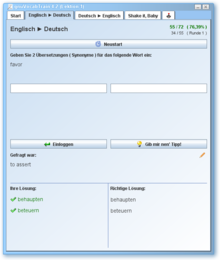Flashcard software
Learning card software are application programs based on the learning card principle. Such programs are often used to learn vocabulary and are therefore to a large extent also referred to as vocabulary trainers . Such programs were first implemented in the 1980s. They are based on the spaced repetition effect, according to which content that is learned over a longer period of time is better retained in the memory than content that is intensively repeated over a short period of time.
Most vocabulary trainers allow both new data sets to be created and data sets to be imported. A complete foreign language basic vocabulary , which corresponds to the level of the general education schools in Germany, comprises approx. 2000 to 4000 words. A collection of this size can no longer be overlooked and therefore cannot be easily created by the user by hand, as gaps and duplicate data records would result.
functionality

Flashcard software works on the principle of a flashcard . In addition, the implementation of the flash card on the computer has some advantages over a paper flash card, e.g. B. that sound recordings can be included for voice output and that a much more sophisticated learning plan can be made.
An alternative method can also be used on the computer in which each card (e.g. a word and its translation) is assigned a certain value n , which increases by one if successful and decreases by one if unsuccessful. The card is then inserted n positions behind the first card (which is requested next). As a result, more successful cards are repeated less often than less successful ones, whereby the latter are repeated particularly often until they are also among the more successful.
However, both the conventional flash card and this method have the disadvantage that the decision as to which material has to be repeated and when is made arbitrarily. Therefore, some software titles offer a repeat preset that “lets the user know” when a card needs to be repeated.
Software products

| Surname | operating system | License | |||||
|---|---|---|---|---|---|---|---|
|
Windows |
macOS |
Linux |
Android |
iOS |
Cloud |
||
| Anki |
|
|
|
|
|
|
Open source |
| gnuVocabTrain |
|
|
|
Freeware | |||
| Han Trainer Pro |
|
|
|
Shareware | |||
| Langenscheidt vocabulary trainer |
|
Proprietary | |||||
| Mnemosyne |
|
|
|
|
Open source | ||
| Parley |
|
Open source | |||||
| phase6 |
|
|
|
Proprietary | |||
| Teachmaster |
|
Freeware | |||||
| Vocabulary trainer |
|
Freeware | |||||
| Brainyoo |
|
|
|
|
|
Freemium | |
| VocApp |
|
|
Proprietary | ||||
| Index card system |
|
Proprietary | |||||
| MemoCard |
|
|
|
|
Freeware | ||
literature
- Thomas Bernhardt, Marcel Kirchner: E-Learning 2.0 in action. “You are the author!” From user to WikiBlog caster. vwh (Verlag Werner Hülsbusch), Boizenburg 2007, ISBN 978-3-940317-16-2 .
- Ludwig J. Issing, Paul Klimsa (Ed.): Online learning. Manual for science and practice. Oldenbourg, Munich 2009, ISBN 978-3-486-58867-5 .
- Sebastian Leitner : This is how you learn to learn. The way to success (= Herder spectrum. 5060). 18th edition. Herder, Freiburg (i. Breisgau) et al. 2011, ISBN 978-3-451-05060-2 .